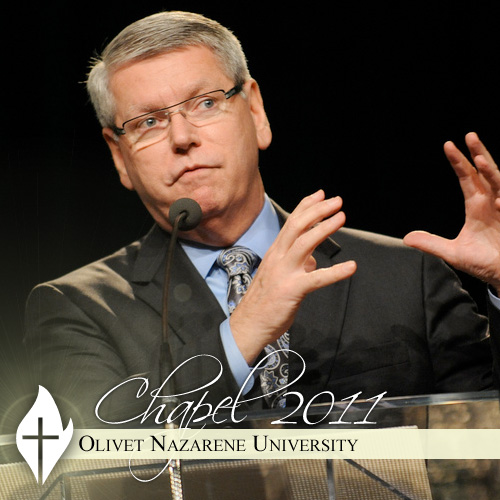Discover 2011 Chapel Audio
2011 Chapel Audio

2011 Chapel Audio
Author: Olivet Nazarene University
Subscribed: 0Played: 8Subscribe
Share
©2011 Olivet Nazarene University. All Rights Reserved.
Description
Chapel is a vital part of community life at Olivet Nazarene University. Through these weekly services, each segment of the college community has the opportunity to join with others for worship, instruction, and encouragement to serve. Notable and world-renown speakers regularly address the Olivet community during chapel. By downloading these inspiring and thought-provoking services, you can - along with the Olivet community - be challenged by some of the country's finest speakers any day of the week.
60 Episodes
Reverse
God spoke in the past, and He is still speaking today if we will listen. The Christian life is a journey of trust, faith, and listening not of sight. The God who came still comes, and that is the Miracle of Christmas.
You don’t think God can use you? Not so fast my friend. The good news for us is that God takes our lives - broken or not - reclaims them, reshapes them, and helps us to recover the dreams he has placed in our hearts. When He does that, it’s always a beautiful thing.
Paralleling our lives with Moses, Dr. Powell shares how we have been chosen for a specific destiny even though it may require a journey in the desert. God calls us to surrender what we have in our hands even though we may view them as inadequate for His service. He takes our “are nots” and lets the world know I AM.
Chaplain Holcomb facilitated an interview with three faculty members about their calling in life and how the Lord orchestrated their steps in the process.
We need to give God our whole lives; Sometimes it is hard to hear God; We are not supposed to fix things. These are all lessons we learn from the story of the Prodigal Son. The crazy grace message is that it is okay to be sick and be loved.
Encouragement was given to begin dreaming about closing the gap between what you are now and what you want to be. This is a journey of recovery not discovery; of remembering those thing you used to be passionate about. God has programed us for a specific niche. Listening for His quiet whisper and being patient on the desert journey to the destination are all part of the process.
God’s call on our lives may not be a traditional one. He does call individuals to the market place to be agents of change and influence. This unique opportunity can be fully realized if our foundation is the Word of God. Vocation and a call can be in harmony wherever the Lord places us.
Christ was not compelling us to do greater works than his in regard to miracle work which is temporal. He was calling us to find joy in the mundane daily moments of life. Moved by the compassion Christ gives us, we must love one another with simple, self-less acts of kindness. What we do matters to the kingdom of God.
God has a heart for reaching the world, so we should too. Obstacles can be overcome in order to be either be a “goer” or a “mobilizer.” The mission of taking the good news around the earth is the purpose for which God created us.
Beginning in the early 1800’s students have been compelled to pray and go around the world in mission work. We have to carefully ask the question, “Why are we doing what we do?” God has used students for hundreds of years, is He calling us to do the same?
An atmosphere of confession and repentance was experienced through the retelling of the David’s sin and confession both in word and drama.
Dr. McCool shared two keys to effective Christian leadership. The first being, our actions must match our words, because it is the basis of trust. The second was leadership has to be implemented with gentleness. Jesus exemplified these two qualities in his leadership style and is our faithful, gentle shepherd leading us in the way we should go.
Who knows where the path God will lead? As we walk in obedience to God, as Queen Esther did, God uses our heritage, natural abilities, and acquired gifts to direct our path with markers along the way.
From the rich story found in I Kings during the time of the wicked rule of King Ahab, Dr. Diehl recounts the story of Elijah’s life. The foundational principles include: 1) Obeying God does not mean that the brook won’t dry up. 2) When the brook in one place dries up God will lead you to the next brook. 3) Great blessings are usually followed by great testing. 4) God is even greater than all of our circumstances.
Twenty-five vitally important truths including practical advice to spiritual formation concepts. The highlights included two key points. 1) We should think critically, but not be critical. 2) God is enough.
To be a citizen of the Kingdom of God we must be forgiving people.
God gives us dreams, and his dreams for our life cannot be derailed by man. As in Jacob’s life, it seemed he was on a detour to Egypt, but God was still at work to bring the dreams to a reality. In our spiritual journey we must just hold on when life is not moving in the direction we think is best and realize that in the meanwhile God is still at work.
Jesus came to set us free from anything that has us bound. Through faith and anointing with oil, captives are set free.
Jesus turns to us as He enters our world as Emmanuel. He desires for us to turn toward Him in response so that He can place a New Song in our hearts.
Looking at the life and experiences of Ruth and Naomi, the message declares, “God Is Enough.”





